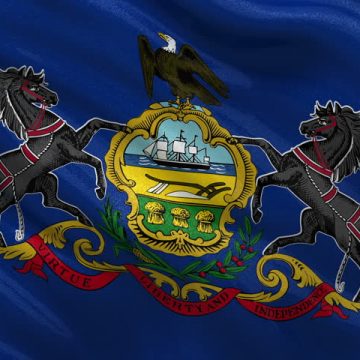
When it opened for business in the late 1970s, Atlantic City was the East Coast gambling mecca. East of the Mississippi, the casinos that made up the New Jersey industry were THE ONLY game in town. Although that has changed over the years, the latest expansion by a neighbor not only in the B&M world but also the online one isn’t expected to impact New Jersey heavily.
Under the new regulations enacted by the Pennsylvania legislature, online poker isn’t the only challenger to a market that New Jersey once cornered. Casino gaming will be allowed at Pennsylvania truck stops and 10 “mini-casinos” will join the 12 full-fledged casinos that already make up the Pennsylvania market. An analyst with a major ratings organization believes he has found statistics that back him up when he says the Jersey casinos won’t be harmed.
Fitch Ratings’ Colin Mansfield, an analyst in the gaming field, indicated that there was little chance the new “mini-casinos” would hurt New Jersey. Because those operations will be located away from the Pennsylvania/New Jersey border, Mansfield says there is no reason to believe there will be an impact. “Honestly, it is hard to lose the same revenue twice,” Mansfield stated.
Another part that will potentially allow the Jersey market to continue to thrive is the taxation rates that the Pennsylvania online operations will be subjected to, at least as the regulations are currently written. Steve Norton, a consultant with Norton Management, said, “Table game tax rates are similar, but considering that 90% of New Jersey’s online gaming operations are from slots (writer’s note: slot taxes in Pennsylvania are currently 54% with 2% more for local taxes; all New Jersey online offerings (slots, poker, table games) are taxed at 17.5%), I’m not sure how many Pennsylvania online operators will be interested in a license.”
The decisions by these well-respected organizations may be correct, but the Atlantic City gaming scene has suffered at the expansion of gaming east of the Mississippi. When it first came out, it was the only game in town. Now neighboring states like New York, Delaware, Maryland, and Pennsylvania all have casino gaming. Furthermore, other states such as Connecticut and Florida have expanded their gaming to challenge New Jersey’s legendary casinos. This is the reason that the Jersey shore is less crowded with casinos nowadays, down to seven from the previous high of 12 only a few short years ago.
Even with this historical background, it may be a bit before New Jersey has to worry about the new regulations in Pennsylvania. Since the passage of those regulations, the body that is tasked with its oversight haven’t exactly been in a hurry to get started. The Pennsylvania Gaming Control Board, who will offer the licenses for the online gaming operations, hasn’t finalized any of the myriad of regulations that they will have to put in place. As such, they haven’t been able to start the clock on the application process.
Once they do get started, operators who are already licensed in the state will get first crack at a license. Over a 90-day period, those operations will be able to apply for individual gaming licenses – covering one of the three gaming options offered (slots, table games and poker) – at the cost of $4 million each. If those already licensed operators want to do all three, they would be able to get a discount on the licenses and only pay $10 million.
After than 90-day period is complete, outside operators will be next in line. Over a span of 120 days, these outside operations (think PokerStars, 888 Holdings or partypoker) will be able to apply for the three gaming options offered at the same $4 million, but will not get a shot at the “hometown discount.” Examining those numbers, it could be late in 2018 before anything opens in Pennsylvania regarding online gaming.
Governor Tom Wolf signed the bill regulating online gaming at the end of October, but the PGCB hasn’t even begun the application procedures for licensing. If they were to open that process today, it wouldn’t be completed until the beginning of July 2018. Figuring in another potential 90-day period for those applications to be reviewed, that pushes the timeline into October. After testing is completed by the individual operators in the state (and those operators’ offerings are cleared by the PGCB), it could very well be December of 2018 before any bets hit the virtual air in the Keystone State.















